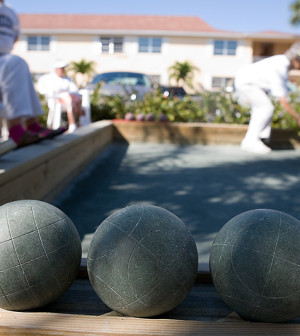- Could Your Grocery Store Meat Be Causing Recurring UTIs?
- Are You Making This Expensive Thermostat Error This Winter?
- Recognizing the Signs of Hypothyroidism
- 10 Strategies to Overcome Insomnia
- Could Artificial Sweeteners Be Aging the Brain Faster?
- Techniques for Soothing Your Nervous System
- Does the Water in Your House Smell Funny? Here’s Why
- Can a Daily Dose of Apple Cider Vinegar Actually Aid Weight Loss?
- 6 Health Beverages That Can Actually Spike Your Blood Sugar
- Treatment Options for Social Anxiety Disorder
Mammography Costs Soar for Seniors, But Detection Rates the Same: Study


The cost of breast cancer screening for older women has soared because of increased use of new technologies, but that hasn’t led to earlier detection of breast cancer, a new study shows.
Researchers compared data from 2001-02 and 2008-09, and found that the use of screening mammography for Medicare-enrolled women without a history of breast cancer remained at about 42 percent.
There was a large increase in the use of digital mammography technology, which is more expensive than standard film technology ($115 versus $73 per mammogram). But the newer technology has not been shown to be more effective in detecting breast cancer in women aged 65 and older, the Yale School of Medicine researchers said.
They also discovered a significant increase in the use of other newer, more expensive technology for breast cancer screening and related procedures.
Overall, Medicare spending for breast cancer screening and related procedures rose from $666 million in 2001-02 to $962 million in 2008-09, according to the study in the July 1 issue of the Journal of the National Cancer Institute.
“Screening mammography is an important tool, but this rate of increase in cost is not sustainable,” study co-author Dr. Brigid Killelea, an assistant professor of surgery, said in a Yale news release.
“We need to establish screening guidelines for older women that utilize technology appropriately, and minimize unnecessary biopsies and over-diagnosis to keep costs under control,” she added.
Further studies are needed to identify which women will benefit from screening, and how to screen effectively and efficiently, study co-author Dr. Cary Gross said in the news release.
“But we cannot simply adopt new technologies because they theoretically are superior — the health system cannot sustain it, and more importantly our patients deserve a sustained effort to determine which approaches to screening are effective and which ones are not,” said Gross, director of the Yale Cancer Outcomes, Public Policy and Effectiveness Research Center.
“In some instances, breast cancer screening can save lives. But no woman wants to undergo testing if it is likely to cause more harm than good,” Gross said.
More information
The U.S. National Cancer Institute has more about breast cancer screening.
Source: HealthDay
Copyright © 2026 HealthDay. All rights reserved.










